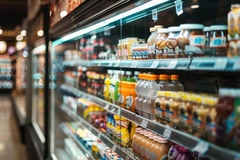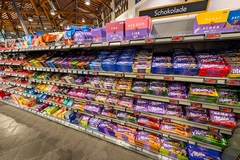
- Industry news
Industry news
- Category news
Category news
- Reports
- Key trends
- Multimedia
- Journal
- Events
- Suppliers
- Home
- Industry news
Industry news
- Category news
Category news
- Reports
- Key trends
- Multimedia
- Events
- Suppliers
Chr. Hansen Solution Shown to Reduce Costs in Cheese Production

A Life Cycle Assessment made on Mozzarella cheese shows that each ton of Mozzarella made with YieldMAX saves 225 kg of CO2. If all Mozzarella type cheeses were made with YieldMAX this would result in approximately 0.6 million tons of CO2 saved.

24/06/09 Yield increases of 2-3% can be obtained with Chr. Hansen’s unique enzyme solution YieldMAX. New research indicates further cost-efficient properties.
New research made with dairy products indicates that Chr. Hansen’s Innovation Award winning YieldMAX (phospholipase) has functionalities that could lead to reduced costs in the processing of liquid dairy products (evaporation, heat treatment and filtration). The functionalities relate to viscosity and surface tension but also to the functionality of e.g. whole milk powder.
“Our goal right now is to further document that the viscosity effect of YieldMAX enables spray-drying at higher total solids level than applied today. If our customers can increase total solids by a few percent before spray-drying this results in higher capacity of spray-dryers but perhaps more importantly, in substantially reduced energy costs," explains Hans Christian Bejder, Marketing Director, Chr. Hansen.
“Right now we are working to establish the optimum flow and process parameters in a whole milk powder line,” he adds.
Improved heat stability of whey proteins creates new opportunities for functional whey proteins. Denaturated whey proteins often set limitations when they are used in functional beverages due to precipitation problems.
"We have data that shows YieldMAX is able to improve the heat stability of ß-lactoglobulin. Whether it is enough to reduce the precipitation problem or whether it opens new opportunities will be further investigated," says Per Munk Nielsen, Senior Science Manager at Novozymes, Chr. Hansen’s strategic alliance partner in developing YieldMAX.
The patented enzyme solution is gaining more and more popularity in the cheese world. It has just won, for the second consecutive year, the Innovation Award, issued by the Dairy Industry Association of Australia, for the significant breakthrough it represents to the dairy industry.
“The food producers are extremely cost-conscious right now focusing on getting the most out of every raw material they put into the production process, and YieldMAX supports this goal in a concrete, measurable way,” says Hans Christian Bejder.
The unique enzyme is used to pre-treat the milk prior to adding the rennet. This enhances the coagulation resulting in an improved fat and protein retention both at whey separation and during stretching of the curd, resulting in increased cheese yield of approximately 2%, some times up to 3%, without compromising on quality and taste.
This means that if a cheese producer today manufactures 20,000 tons of Mozarella or other Pasta Filata type cheeses, he has the opportunity to get an additional 400,000 kilo out of the same amount of milk.
Increased yields have been seen in many types of cheese, in particular those made with elevated scalding temperatures. “On top of the improved retention of fat and protein we have seen that YieldMAX actually helps some of our customers gain better control of the water content in their cheeses thereby improving the quality of the cheese,” explains Bejder.
Because more cheese can be made with the same amount of milk YieldMAX contributes to sustainable development. A Life Cycle Assessment made on Mozzarella cheese shows that each ton of Mozzarella made with YieldMAX saves 225 kg of CO2. If all Mozzarella type cheeses were made with YieldMAX this would result in approximately 0.6 million tons of CO2 saved. This corresponds to the annual CO2 load of 150,000 cars.









